
Steppenwolf was a Canadian-American rock band that was prominent from 1968 to 1972. The group was formed in late 1967 in Los Angeles by lead singer John Kay, keyboardist Goldy McJohn, and drummer Jerry Edmonton, all formerly of the Canadian band the Sparrows. Guitarist Michael Monarch and bass guitarist Rushton Moreve were recruited via notices placed in Los Angeles-area record and musical instrument stores.

Hi Infidelity is the ninth studio album by American rock band REO Speedwagon, released on November 21, 1980, by Epic Records. The album became a big hit in the United States, peaking at number one on the Billboard 200, spending 15 weeks at number one. It went on to become the biggest-selling album of 1981, eventually being certified 10 times platinum by the Recording Industry Association of America.
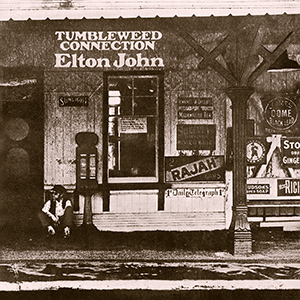
Tumbleweed Connection is the third studio album by English singer-songwriter Elton John. It was recorded at Trident Studios, London, in March 1970, and released in October 1970 in the UK and January 1971 in the US. It is a concept album based on country and western and Americana themes. All songs are written by John and Bernie Taupin, with the exception of "Love Song" by Lesley Duncan.

Three Dog Night is the debut album by American rock band Three Dog Night. The album was originally released by Dunhill Records on October 16, 1968. The album is known for featuring the band's Top 5 hit single, their cover of Harry Nilsson's song "One".
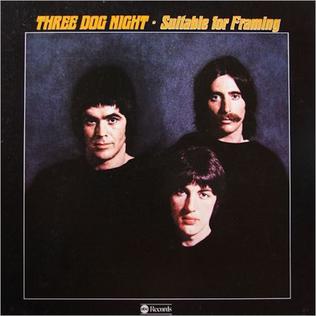
Suitable for Framing is the second studio album by American rock band Three Dog Night. The album was released on the Dunhill record label on June 11, 1969 and was the first of two albums released by the band that year.

Captured Live at the Forum is the third album by American rock band Three Dog Night, released in 1969.

It Ain't Easy is the fourth album by American rock band Three Dog Night, released in 1970.

Love Stinks is the ninth studio album by American rock band the J. Geils Band. The album was released on January 28, 1980, by EMI Records.
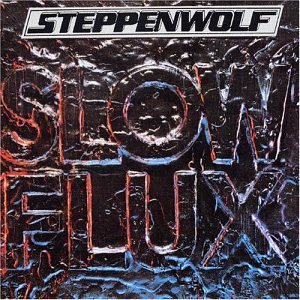
Slow Flux is the seventh studio album by Canadian-American rock band Steppenwolf. The album was released in August 1974, by Epic Records. In the US it was released on the Mums Records label, a short-lived CBS Records subsidiary. It was the first of three albums the band created after reforming in 1974 before they disbanded again in 1976. "Straight Shootin' Woman" was the last Steppenwolf song to chart on the Billboard magazine Top 40. The song "Children of the Night" notably posits that the hippie movement at this time had died, and president Richard Nixon is referred to as "the fool who believed that wrong is right".

Steppenwolf is the debut studio album by Canadian-American rock band Steppenwolf, released on January 29, 1968, on ABC Dunhill Records. It includes songs written by band members and songs written by others such as the Willie Dixon blues classic "Hoochie Coochie Man", retitled "Hootchie Kootchie Man".
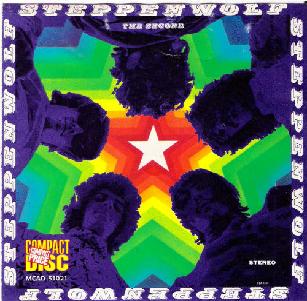
The Second is the second studio album by Canadian-American rock band Steppenwolf, released in October 1968 on ABC Dunhill Records. The album contains one of Steppenwolf's most famous songs, "Magic Carpet Ride". The background of the original ABC LP cover was a shiny "foil", in contrast to later LP issues and the modern CD sleeve.

At Your Birthday Party is the third studio album by Canadian-American rock band Steppenwolf. The album was released in March 1969, by ABC Dunhill Records.

Monster is the fourth studio album by Canadian-American rock band Steppenwolf. The album was released in November 1969, by ABC Dunhill Records. It was their first LP with new lead guitarist Larry Byrom instead of Michael Monarch. The album was Steppenwolf's most political album, making references to important issues at the time, such as the Vietnam War.
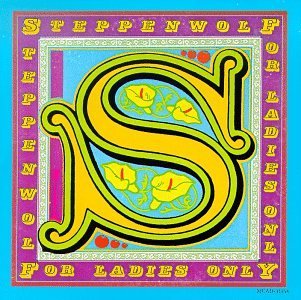
For Ladies Only is the sixth studio album by Canadian-American rock band Steppenwolf. The album was released in November 1971, by Dunhill Records. It is a political concept album mainly about feminism but with several more conventional songs about romance as well, both unusual themes for Steppenwolf. Some critics saw the album as sexist, citing the lyrics of the songs and a photo of a car shaped like a penis alongside the Hollywood Walk of Fame in the gatefold. The album saw the band hinting toward the progressive rock movement that was popular at the time with more complex arrangements and sophisticated keyboard playing, particularly on the title track. Like their previous album, it was accompanied by two minor hit singles which fell just short of the Top 40.

Skullduggery is the ninth studio album by Canadian-American rock band Steppenwolf. The album was released in May 1976, by Epic Records. It was the third of four released by Epic Records, and the last to feature keyboardist Wayne Cook, who left to join Player in 1977. It is the also the last album to be released simply under the Steppenwolf name before the group rebranded themselves as John Kay & Steppenwolf.

Steppenwolf Live is primarily a collection of recordings from a single concert early in 1970 at the Santa Monica Civic Auditorium by Steppenwolf staged in support of their 1969 album Monster. Released in April 1970 by Dunhill Records, it contains Steppenwolf's well-known hits: "Born to Be Wild", "Magic Carpet Ride" and "The Pusher", as well as most of the songs from Monster, including three previous top 40 hits, as well as the top 40 hit "Hey Lawdy Mama" from this album.

16 Greatest Hits is a compilation album by Steppenwolf, released in 1973. It features some of their most famous songs, including "Born to Be Wild", "The Pusher", and "Magic Carpet Ride", and "Hey Lawdy Mama." The album consisted of the 11 tracks from the previous Gold: Their Great Hits album, in the same order as on the two sides of that earlier album, with the addition of the final two tracks on side 1, and the final three tracks on side 2.

George Michael Biondo is a musician who served as bass guitarist of the Canadian rock band Steppenwolf from April 1970 to October 1976. Born in New York, Biondo has been based in Southern California throughout a career as a session musician and songwriter.

Gold: Their Great Hits is a greatest hits album released by the Canadian-American hard rock band Steppenwolf. The album, released in 1971, charted at #24 on the Billboard Pop Albums charts and was certified "gold" by the RIAA on April 12, 1971. Initial pressings of the album came in a gatefold sleeve, with a detachable poster of the band.

Forgotten Songs and Unsung Heroes is the first solo album by German-Canadian musician John Kay. It was released on Dunhill Records in 1972.


















